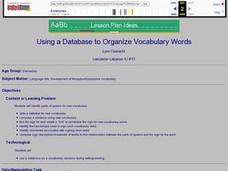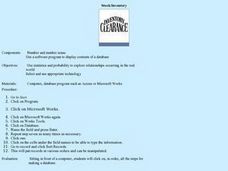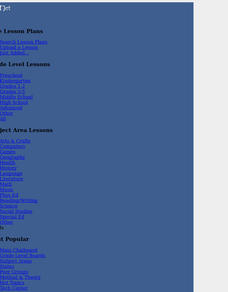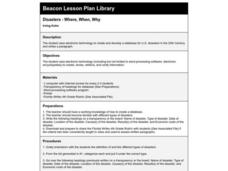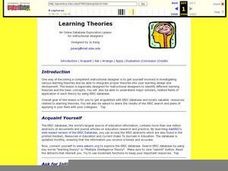Curated OER
Skyscrapers from New York to California
Third graders use an online database to gather information on skyscrapers. Using the information, they choose one building and record its height and location. In groups, they design a city skyline including the skyscraper they choose....
Curated OER
Get Ready For Some Football
Sixth graders compare and contrast the totals from two national football teams for the year. Using the internet, they search for the information they need and create a data bar graph. They use the information they collected to answer...
Brigham Young University
Putting Ideas Together
As part of their study of set design, theater arts students put together what they have learned so far and create a thumbnail sketch of a set that they feel captures the style and mood they want to project.
Curated OER
Using a Database to Organize Vocabulary Words
Students use a database as a vocabulary resource during writing/reading. They preview stories and list unknown works into their reading notebooks. Students find the definitions, and enter their words into a database using a teacher...
Curated OER
Create a Holiday
Students create their own holidays, describing them in booklet form. They develop the holiday's name, symbol, colors, food, and historical significance.
Curated OER
Technology Integration Lesson Plan: Music Database
Eighth graders gather information on fifteen of their favorite songs, create database with fields representing different attributes, explore and sort their databases, and create charts and graphs showing amount of play time vs. popularity.
Curated OER
Database Scavenger Hunt
Students create a database to show information about events in history. In this database lesson, students create and analyze information on the slave trade. Students answer questions based on the information collected.
Curated OER
Stock and Inventory
Students create databases. In this spreadsheet lesson plan, students take stock of their toys and create databases. Students consider good business practices as they listen to guest speaker discuss how to control inventory.
Curated OER
Giants of the Century
Middle and high schoolers study significant people who shaped the 20th-century history and are introduced to database tools. Researchers use the Internet to research five 20th century history makers. They write a short biography of five...
Curated OER
National Marine Sanctuaries Shipwrecks
Junior oceanographers access the Channel Islands National Marine Sanctuary Shipwreck Database and plot the locations of several shipwrecks. Shipwrecks are always an enthralling subject and this activity allows your learners to act as...
Curated OER
Creating a Database: Africa, Technology, Social Studies
Students use technology to create a database demonstrating their knowlede (in the case) of the African Continent. This project could be applied to almost any other concept studied.
Curated OER
Disasters - Where, When, Why
Fourth graders research natural disasters that have occurred in the US in the twentieth century. They create computer based database and use the information to write a paragraph.
Curated OER
Burning It Up
Students explore energy as it relates to body function. Data about the personal physical activity of students is gathered and entered into a database which is utilized to test hypotheses made.
Curated OER
For The Record
Students create a database that catalogs their music collection of CD's and tapes. They sort, analyze and print selected database records in answer to questions about their favorite music recordings and performing artists. Each student...
Curated OER
Graphically Speaking
Students discover the links between population and Congressional representation. In this government lesson, students research population statistics and create spreadsheets that compare population to the number of Congress members per state.
Curated OER
For the Record: Black Inventors and Inventions
Students research the Internet for information about African-American inventors and their inventions. After collecting their data, students must build and manage information in a database that catalogs the inventions of African-Americans.
Curated OER
Learning Theories
Students access the ERIC database and search for the resources on learning theories. They use the features of ERIC to bookmark sources and then use Excel to create a summary of the database search.
Curated OER
Research Paper
Ninth graders continue to work on their research papers including to credit and cite all resources used, incorporate a style manual, electronic databases, online resources as well as a Works Cited page. In addition, they orally present...
Curated OER
Create and Locate Your Own Business
High schoolers simulate the creation of their own business. Using the internet and database exploration, they research community profiles and select a business. Pupils define the target market and investigate a business location. ...
Curated OER
Candy Database
Students make a database of their Halloween candy and decide which types are the healthiest. In this diet lesson, students make written data charts using their candy, locate dietary information on one type, sort the candy by shape, and...
Curated OER
Creating Station Models
Learners review weather conditions at various cities and create station models on a weather map.
Curated OER
Creating a Heroic Character
Students answer a series of defining questions that lead them to develop a fully realized heroic character. They create a variety of multimedia representations of their hero, including video interviews, HyperStudio stacks, web pages, and...
Curated OER
Create a "Hero" Trophy
Students identify American heroes. In this research skills lesson plan, students discuss the characteristics of heroes and examine society's definition of heroes. Students research selected American heroes of the 20th century and create...
Curated OER
Examine the Data
Seventh graders examine a teacher-created database and identify specific variables and develop hypothesis statements as to their possible effect. They create a summary statement either proving or disproving their hypothesis.





